
Kansas is an American rock band that formed in 1973 in Topeka, Kansas, and became popular during the decade initially on album-oriented rock charts and later with hit singles such as "Carry On Wayward Son" and "Dust in the Wind". The band has produced nine gold albums, three multi-platinum albums, one other platinum studio album (Monolith), one platinum live double album, and a million-selling single, "Dust in the Wind". Kansas appeared on the US Billboard charts for over 200 weeks throughout the 1970s and 1980s and played to sold-out arenas and stadiums throughout North America, Europe and Japan. "Carry On Wayward Son" was the second-most-played track on US classic rock radio in 1995 and No. 1 in 1997.

Face the Music is the fifth studio album by Electric Light Orchestra (ELO). It was released in September 1975 by United Artists Records and on 14 November 1975 in the United Kingdom by Jet Records. The album moves away from the large-scale classical orchestrated sound of the previous album, Eldorado, in favour of more "radio-friendly" pop/rock songs, though the string sections are still very prominent. The new sound proved successful for the group, for Face the Music was the first ELO album to go platinum.
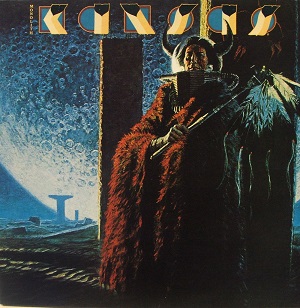
Monolith is the sixth studio album by American progressive rock band Kansas, released in 1979. The album reached No. 10 on the Billboard album charts, marking their third straight studio album to reach the top ten.

Somewhere to Elsewhere is the fourteenth studio album by American rock band Kansas, released in 2000. It is Kansas' first album to feature the band's original lineup since 1980's Audio-Visions, along with Billy Greer, who joined the band in 1985. Steve Walsh tracked vocals in his home studio while working on his second solo album Glossolalia and did not join the rest of the band at Kerry Livgren's studio. His contribution were solely vocals. Livgren composed all of the album's tracks, and the hidden track "Geodesic Dome" is his first and only lead vocal on a Kansas song. Somewhere to Elsewhere is Kansas' last studio album to feature both Robby Steinhardt, who left the band in 2006 and died in 2021, and Steve Walsh, who left the band in 2014.

"Run Like Hell" is a song by English progressive band Pink Floyd, written by David Gilmour and Roger Waters. It appears on the album The Wall. It was released as a single in 1980, reaching #15 in the Canadian singles chart and #18 in Sweden, but it only reached #53 in the U.S. A 12" single of "Run Like Hell," "Don't Leave Me Now" and "Another Brick in the Wall " peaked at #57 on the Disco Top 100 chart in the U.S. To date, it is the last original composition written by both Gilmour and Waters, the last of such under the Pink Floyd banner, and is the last composition ever recorded by all four members of the classic 70s-era Floyd lineup together, within their traditional instrumental roles of Waters on bass, Gilmour on guitars, Nick Mason on drums, and Richard Wright on keyboards, on the same song.

Device – Voice – Drum is a live DVD by American rock band Kansas, released in 2002. The same concert was released as an enhanced double-CD live album. The CD release features the enhanced live track, "Distant Vision".

"Dust in the Wind" is a song recorded by American progressive rock band Kansas and written by band member Kerry Livgren, first released on their 1977 album Point of Know Return.
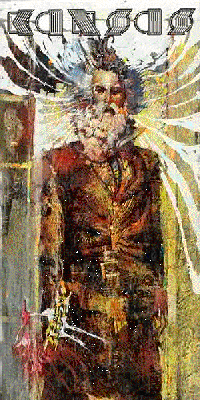
The Kansas Boxed Set is the third compilation from the band Kansas. It was originally released in 1994, and was the band's first boxed set overview. It focuses solely on the original line-up of the band, from their first album in 1974 to Audio-Visions in 1980. It also includes a new track "Wheels". The release was supervised by all the original band members, unlike the first release of The Best of Kansas in 1984.

Sail On: The 30th Anniversary Collection is the fifth compilation from the band Kansas, originally released in 2004. Along with two CDs that include tracks from each one of the band's studio albums, the compilation also includes a 16-track companion DVD which features numerous television appearances, videos, and live recordings. The title Sail On comes from a lyric in the band's 1975 song "Icarus ", which is included in the collection.

The Ultimate Kansas is the fourth compilation from the band Kansas. It was originally released in 2002, and focuses solely on their Kirshner period from their debut album Kansas in 1974, up to and including Drastic Measures in 1983. The collection was rereleased in 2008 under the title Essential Kansas 3.0 as part of the Sony/BMG Legacy series of that name, with an additional "bonus disc" with seven additional songs, and featuring "eco-friendly" packaging.

Works in Progress is a CD/DVD release from the band Kansas, bringing together songs from the last ten years (1992–2002) of the band's career, featuring music from Live at the Whisky, Freaks of Nature, and Device – Voice – Drum. In addition, the companion DVD collects a number of live performances originally featured on Live at the Whisky and Device – Voice – Drum. The title is a pun based on their progressive rock genre.
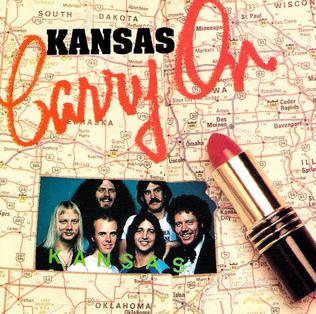
Carry On is the second compilation from American rock band Kansas, released in 1992. It was later repackaged and re-released in 2005 as On the Other Side ; also, "Play the Game Tonight" and "Don't Take Your Love Away" were replaced with "What's on My Mind" and "Child of Innocence."
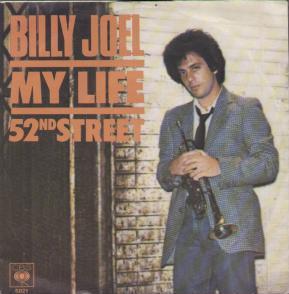
"My Life" is a song by Billy Joel that first appeared on his 1978 album 52nd Street. A single version was released in the fall of 1978 and reached No. 2 on the U.S. adult contemporary chart. Early the next year, it peaked at No. 3 on the Billboard Hot 100.

"Rosanna" is a song written by David Paich and performed by the American rock band Toto, the opening track and the first single from their 1982 album Toto IV. This song won the Grammy Award for Record of the Year at the 1983 ceremony. "Rosanna" was also nominated for the Song of the Year award. It is regarded for the half-time shuffle which drummer Jeff Porcaro developed for the song. The groove has become an important staple of drum repertoire and is commonly known as the "Rosanna shuffle".

"Play the Game Tonight" is a progressive rock single recorded by Kansas for their 1982 album Vinyl Confessions. It managed to chart at No. 17 on the Billboard Hot 100 chart, becoming the 15th single, 10th top 100 hit, sixth top 40 hit, and the third of four Top 20 hits produced by Kansas.
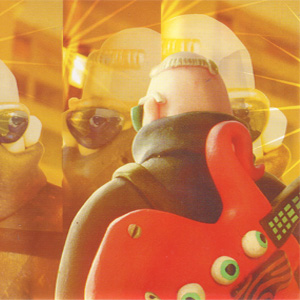
"Do or Die" is the eleventh single by Super Furry Animals. It was the third and final single to be taken from the Guerrilla album and was the band's last release for Creation Records. The track reached number 20 in the UK Singles Chart after its release on 17 January 2000. The group had originally wanted to release "Wherever I Lay My Phone " as the final single from Guerilla but Creation instead chose "Do or Die", a decision which the band claimed not to understand.

"Ysbeidiau Heulog" is the twelfth single by Super Furry Animals. It was the only single to be taken from the album Mwng and was released as a limited edition 7" vinyl on the band's own Placid Casual label on 1 May 2000. It was the band's first single to chart outside the UK Singles Top 75 peaking at number 89. The Welsh language song has been described by singer Gruff Rhys as "throwaway pop" and likened to the music of ELO, The West Coast Pop Art Experimental Band and Os Mutantes.
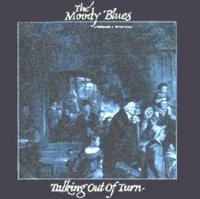
"Talking Out of Turn" is a 1981 single written by John Lodge and first released by the Moody Blues on their 1981 album Long Distance Voyager. It was also released as the third single from the album in November 1981 with "Veteran Cosmic Rocker" on the B-side.

"I'm Not the One" is a song by the American rock band the Cars, from their fourth album, Shake It Up. It features Ric Ocasek on lead vocals, Benjamin Orr singing the 'you know why' phrase, and the whole group repeating "going round and round" as backing vocals throughout the song.
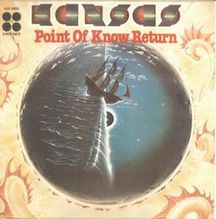
"Point of Know Return" is a song by the progressive rock band Kansas written by Steve Walsh (lyrics), Robby Steinhardt, and Phil Ehart for their 1977 album Point of Know Return.




















